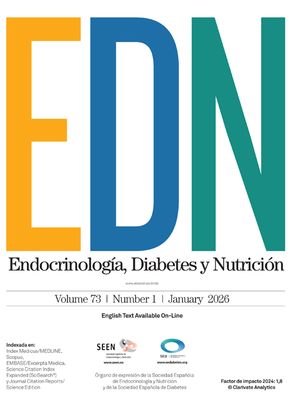Despite the great advances in the sensitivity and specificity of laboratory methods, cases with significant clinical-biochemical discrepancies still occur in some patients. A case of technical interference in the laboratory is reported below.
This was a 38-year-old male patient with a history of X-linked adrenoleukodystrophy (XLAD), confirmed by genetic study and fatty acid tests. Laboratory tests and clinical signs were also consistent with adrenal insufficiency. Since diagnosis the patient had received treatment with low-dose hydrocortisone, 15mg daily in two divided doses, and was asymptomatic. He had been clinically monitored by the endocrinology department of our hospital since 2010. The patient had participated in different clinical trials for patients with XLAD, in which he received different antioxidant drugs. In January 2016, thyroid function tests showed a thyroid-stimulating hormone level of 0.07mcU/mL (reference range: 0.30–5mcU/mL) and a free thyroxine level of 3.89ng/dL (reference range: 0.93–1.7ng/dL). The patient denied any clinical symptom of hyperthyroidism, and the physical examination was normal.
Because of the clinical-biochemical discordance, the patient was asked about the treatment he was receiving, and reported that he was participating in a clinical trial with biotin (300mg/day). The references consulted confirmed that biotin may interfere with laboratory tests using antibodies (Ab) or antigens (Ag) conjugated with biotin in their reactions. This was the case in the initial results of TSH and FT4 obtained with TSH and FT4 II REAGENTS (Roche diagnostics®, Modular E170). It was therefore decided to repeat the thyroid function tests using an alternative chemiluminescence immunoassay for TSH and FT4 (Siemens, ADVIA Centaur®) that uses acridinium ester to label the reaction. The results obtained were: FT4 1.03ng/dL (reference range: 0.89–1.76ng/dL) and TSH 2.340mcU/mL (reference range: 0.550–4.780mcU/mL). Hyperthyroidism was ruled out, and technical laboratory interference was confirmed.
Vitamin B,8 vitamin H, or biotin is a water soluble B-group vitamin occurring in small amounts in many foods. Biotin acts as a cofactor for carboxylase enzymes, including acetyl-CoA carboxylase, which is involved in fatty acid biosynthesis and elongation; pyruvate carboxylase, involved in gluconeogenesis; methylcrotonyl-CoA carboxylase, essential for leucine degradation; and propionyl-CoA carboxylase. Although mammalians cannot synthesize biotin, biotin deficiency is very rare, because it is present in a wide variety of vegetable and animal foods.1 The recommended daily doses in adults are 30μg/day of biotin.2 Biotin supplements are indicated in deficiency states and pregnancy. Some studies have related biotin supplementation to improved metabolic control in diabetic rats.1,3 Biotin is also used to treat alopecia.4 It is also used, as in the case reported, for the treatment of progressive multiple sclerosis and adrenomyeloneuropathy5 at high doses (300mg/day), up to 10,000 times higher than the recommended daily dose for healthy adults.
Despite technological advances and the availability of increasingly sensitive laboratory tests, discrepancies between clinical and biochemical findings sometimes occur. Abs causing interference in immunoassays (heterophile Abs, rheumatoid factor, etc.) may cause discrepancies in the measurement of thyroid hormones6,7 or even of multiple hormones, at the same time.8
The investigation of interferences should usually include repeat measurements, the performance of tests with dilutions, the addition of immunoglobulins to block interfering antibodies, or the use of an alternative immunoassay; the latter is the easiest and fastest means of evaluating any potential interference.6,7
In the case reported, the patient had values consistent with hyperthyroidism but no clinical signs of this condition and was taking high doses of biotin, which led us to suspect laboratory interference.
Biotin is used in some commercial assay kits because of its easy binding to Abs and, to a lesser extent, antigen. Biotin interference may occur in immunoassays using the vitamin.
TSH is measured using non-competitive or immunometric (sandwich) immunoassays. The latter use two different monoclonal Abs which bind to different parts of the Ag. One Ab is usually on a solid support, and the other Ab is labeled. The TSH and FT4 II immunoassay from Roche diagnostics for measuring TSH, uses biotinylated monoclonal TSH-specific Abs and monoclonal TSH-specific Abs labeled with ruthenium chelate, which react to form the complex (sandwich). After the addition of streptavidin, the complex binds to the solid part through the interaction between biotin and streptavidin. Microparticles are captured magnetically by an electrode, and the application of a voltage induces chemiluminescence, which is the parameter measured. Biotin concentrations greater than 25μg/L distort the result by competing with biotinylated Abs at their binding site with streptavidin, causing a false low signal (falsely low TSH levels). To measure FT4 levels, a competitive immunoassay with anti-thyroxine monoclonal Abs is used, in which T4 is biotinylated. High biotin concentrations cause a reduction in the light generated, which is inversely proportional to the concentration of the free part of the analyte. Thus, high biotin concentrations cause positive interference with FT4.9
When an immunoassay using no biotin (such as the Advia Centaur®, Siemens) is used, the interference disappears, showing the actual thyroid function of the patient.
Interference with immunoassays requires constant vigilance and good communication between laboratory professionals and clinicians. Although such situations are exceptional, they should be aware of any potential interference and of the need to verify the consistency of the results with the clinical signs before starting unnecessary interventions or treatments.
Please cite this article as: Simó-Guerrero O, Giménez-Pérez G, Recasens-Gracia A, Villà-Blasco C, Castells-Fusté I. Falso hipertiroidismo franco por interferencia en inmunoanálisis. Endocrinol Nutr. 2016;63:431–432.




